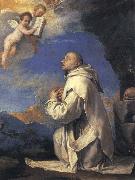Wholesale Oil Painting No Minimum |
|||||||||||
|
|
|||||||||||

|
|||||||||||
|
|
|
||||||||
Jusepe de Ribera1591-1652 Spanish Jusepe de Ribera Galleries Jusepe de Ribera (January 12, 1591 - 1652) was a Spanish Tenebrist painter and printmaker, also known as Jos?? de Ribera in Spanish and as Giuseppe Ribera in Italian. He was also called by his contemporaries and early writers Lo Spagnoletto, or "the Little Spaniard". Ribera was a leading painter of the Spanish school, although his mature work was all done in Italy. In his earlier style, founded sometimes on Caravaggio and sometimes on the wholly diverse method of Correggio, the study of Spanish and Venetian masters can be traced. Along with his massive and predominating shadows, he retained from first to last a great strength in local coloring. His forms, though ordinary and sometimes coarse, are correct; the impression of his works gloomy and startling. He delighted in subjects of horror. In the early 1630s his style changed away from strong contrasts of dark and light to a more diffused and golden lighting. Salvator Rosa and Luca Giordano were his most distinguished followers, who may have been his pupils; others were also Giovanni Do, Enrico Fiammingo, Michelangelo Fracanzani, and Aniello Falcone, who was the first considerable painter of battle-pieces. Among Ribera's principal works could be named "St Januarius Emerging from the Furnace" in the cathedral of Naples; the "Descent from the Cross" in the Certosa, Naples, the "Adoration of the Shepherds" (a late work, 1650), now in the Louvre; the "Martyrdom of St Bartholomew" in the Prado; and the "Pieta" in the sacristy of San Martino, Naples. His mythologic subjects are often as violent as his martyrdoms: for example, "Apollo and Marsyas", with versions in Brussels and Naples, or the "Tityus" in the Prado . The Prado and Louvre contain numbers of his paintings; the National Gallery, London, three. He executed several fine male portraits and a self-portrait. He was an important etcher, the most significant Spanish printmaker before Goya, producing about forty prints, nearly all in the 1620s. |
||||||||
|
|
||||||||
Vision fo St.Bruno
Vision fo St.Bruno Painting ID:: 32915 |
mk84
1643
Naples
38x27cm
mk84 1643 Naples 38x27cm |
|||||||
|
CONTACT US |

